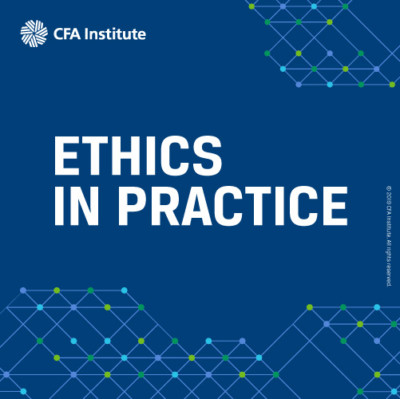Ethics in Practice: Futures Trading. Case and Analysis–Week of 18 November
Check the analysis of this week’s case (18 November) to see if you made the right choice.
Case
At the beginning of the year, Ito joined Dachshund Investment Strategies as Head of Trading, responsible for supervising all traders at the firm. One of the traders under Ito’s supervision is responsible for trading futures contracts for clients, including silver and gold futures contracts on the COMEX contract market. Over the course of the previous 18 months, the trader placed hundreds of orders for futures contracts on these commodities, then canceled the orders before their execution with the intent to move the market in a direction favorable to genuine client orders. Ito finds out about the trader’s conduct six weeks into his tenure. He promptly suspends the trader and reports the conduct to the firm’s management committee, shareholders, and regulator as well as the CFA Institute Professional Conduct Program.
In coordination with the firm’s chief compliance officer, Ito conducts an internal review of all aspects of the trader’s activities for the past three years, which reveals the scope of the misconduct. In the ensuing months, Ito leads an overhaul of Dachshund’s systems and controls and implements a variety of enhancements to detect and prevent similar misconduct. As part of this process, Ito hires a compliance consultant to assist in revising the firm’s trading compliance and surveillance programs. Ito develops and implements anti-manipulation training for his traders, stages a series of compliance workshops, establishes a trading compliance risk management committee, creates a new trading compliance program, and builds a new trade reporting and review framework. With respect to the Ito’s responsibilities under the CFA Institute Code of Ethics and Standards of Professional Conduct (Code and Standards), which of the following is most likely true based on the facts presented? Ito
- violated the Code and Standards because the trader engaged in misconduct.
- failed to appropriately supervise the trader.
- inappropriately shared confidential internal information outside the firm.
- acted appropriately when confronted with the trader’s misconduct.
- none of the above.
Analysis
This case relates to Ito’s responsibilities under CFA Institute Standard of Professional Conduct IV(C): Responsibilities of Supervisors, which requires CFA Institute members to make reasonable efforts to ensure that anyone subject to their supervision complies with applicable laws, rules, regulations, and the Code and Standards. In this case, Ito supervised a trader who engaged in market manipulation through “spoof” trades over the course of several months. Arguably, the fact that the misconduct went on so long is an indication that Dachshund’s policies and procedures to prevent this type of fraud by traders were inadequate. But misconduct on the part of an employee under your supervision does not automatically mean that you have violated your responsibilities under Standard IV(C).
In this case, Ito was not responsible for developing those policies and procedures and had only recently been hired. He most likely had not yet had time to become aware of the misconduct or bring any inadequate compliance system to the firm’s attention. When Ito does become aware of the trader’s misconduct, he promptly initiated an appropriate and thorough review to determine the extent of the wrongdoing, reported the misconduct to the appropriate parties, developed and implemented new compliance procedures, engaged in remedial measures, and trained those under his supervision as to the expected and proper standard of conduct. Providing information to entities outside the firm responsible for enforcement of securities regulations and compliance with the CFA Institute Code and Standards is best practice at a minimum and may be required by applicable law. Choice D is the best response.
This case is based on an enforcement action by the US Commodity Futures Trading Commission in October 2019. In recognition of the company’s self-reporting, cooperation, and remediation, the Commission imposed a significantly reduced civil monetary penalty against the firm.
Let us know what you think of Ethics in Practice by taking this short survey.
Have an idea for a case for us to feature? Send it to us at [email protected].
More About the Ethics in Practice Series
Just as you need to practice to become proficient at playing a musical instrument, public speaking, or playing a sport, practicing assessing and analyzing situations and making ethical decisions develops your ethical decision-making skills. The Ethics in Practice series gives you an opportunity to “exercise” your ethical decision-making skills. Each week, we post a short vignette, drawn from real-world circumstances, regulatory cases, and CFA Institute Professional Conduct investigations, along with possible responses/actions. We then encourage you to assess the case using the CFA Institute Ethical Decision-Making Framework and through the lens of the CFA Institute Code of Ethics and Standards of Professional Conduct.
Image Credit: ©CFA Institute


acted appropriately when confronted with the trader’s misconduct.
According to the Standards Practice Guidance 2014 “A member or candidate with supervisory responsibility should bring an inadequate compliance system to the attention of the firm’s senior managers and recommend corrective action. If the member or candidate clearly cannot discharge supervisory responsibilities because of the absence of a compliance system or because of an inadequate compliance system, the member or candidate should decline in writing to accept supervisory responsibility until the firm adopts reasonable procedures to allow adequate exercise of supervisory responsibility”
Does a supervisor have a reasonable time (how long should be?) to detect failures to the current compliance system once he/she accepted a responsabiity position? Or he/she must investigate about the current compliance system of the firm he/she is applying before accepting a responsabiity position and recommend to the senior management corrective actions? May be the case a firm is involved in violation of the code or the laws/regulations (according to public information) and a member or candidate must not accept a position of responsability there until a proper plan and execution is being applied to restore an effective compliance system. Thanks in advance of considering answer this comment.